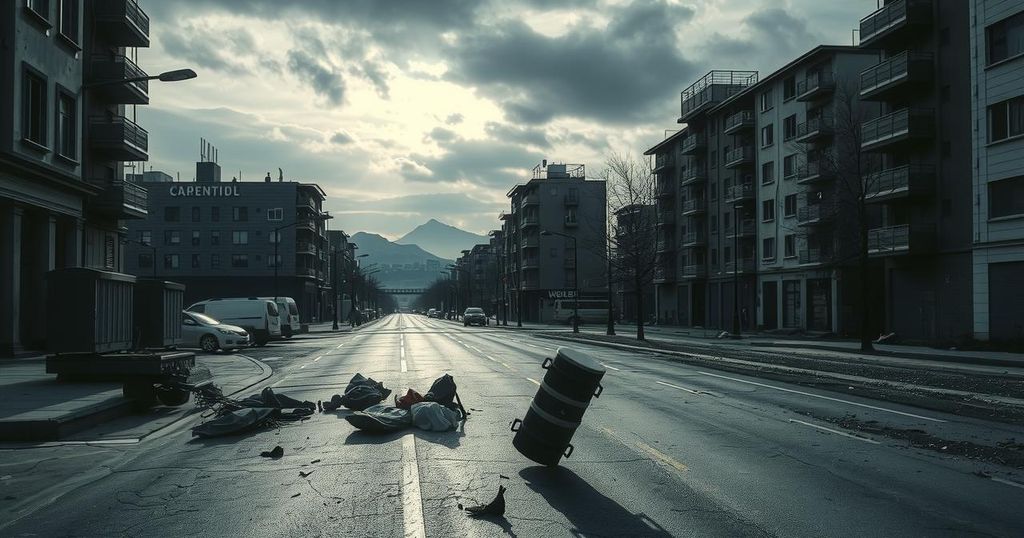Escalating Conflict in the DRC: The Rising Threat of M23

An insurgency by the M23 rebel group escalates in the Democratic Republic of Congo, leading to significant territorial gains, humanitarian crises, and international concern. The conflict, marked by violence in Goma, has displaced over 400,000 people while provoking tense dynamics involving foreign powers like Rwanda and China, raising fears of broader regional instability.
The Democratic Republic of Congo (DRC) is currently engulfed in a severe insurgency led by the M23 rebel group, which seeks to exert control over more territory. The recent capture of Goma, a strategic city in the eastern region, marks a significant escalation in a conflict that has persisted for over a decade. The United Nations has issued warnings about the potential for widespread war in this historically volatile region.
M23’s leader, Corneille Nangaa, has declared intentions to drive the conflict toward the capital, Kinshasa. Meanwhile, President Félix Tshisekedi’s government is mobilizing resources to challenge the rebels’ advances, aiming to reclaim all territory lost. The current violence has displaced over 400,000 individuals in just one month and gravely affected local infrastructure.
The DRC has a long history of violence and instability dating back to its independence from Belgium in 1960. Recent clashes have intensified, especially since January, when M23 increased its offensive backed by Rwanda. The humanitarian impact is dire, with corpses lining the streets of Goma and essential services disrupted, leading to a critical food shortage.
International responses have been tepid, and local efforts to counter M23 have been compromised. Romanian mercenaries fighting alongside Congolese forces have reportedly sought sanctuary with U.N. peacekeepers, illustrating the severe challenges facing the Congolese military. French Foreign Minister Jean-Noël Barrot’s recent meetings with President Tshisekedi showcase international concern amidst protests against perceived inaction.
The M23 group, primarily composed of ethnic Tutsi, emerged from regional ethnic tensions exacerbated by the Rwandan genocide in 1994. Although previous peace agreements were established, they failed to eliminate the underlying causes of conflict, resulting in further fracturing among armed groups. Accusations persist regarding Rwandan support for M23, which claims the DRC has not sufficiently protected ethnic Tutsi.
China plays a significant role in the mineral extraction landscape of the DRC, with Chinese companies controlling a substantial portion of cobalt production. While the conflict raises concerns about market stability, experts suggest the immediate threat to mineral supply chains remains low. Nevertheless, China has condemned M23’s actions as contributing to regional instability.
Rwanda’s involvement in the conflict is contentious, given its historical support for M23. While the international community has previously opposed Rwanda’s actions, recent events reflect a complex balance of geopolitical interests as much of the support for Rwanda persists. Increased scrutiny on Rwandan involvement may alter Western engagement moving forward.
In summary, the DRC faces escalating violence driven by the M23 insurgency, amid significant international attention and humanitarian crises. The impacts of this conflict will undoubtedly resonate beyond its borders, given the DRC’s critical mineral resources and complex regional dynamics.
The Democratic Republic of Congo has been plagued by conflict for decades, greatly influenced by its rich mineral wealth and complex ethnic dynamics. The ongoing insurgency by the M23 group is a significant development in a long history of violence, which includes prior regional wars. The geopolitical implications are far-reaching, especially considering the involvement of foreign powers like Rwanda and the economic interests of countries like China.
The situation in the Democratic Republic of Congo continues to deteriorate due to the aggressive expansion of the M23 rebel group. With thousands displaced and ongoing violence threatening regional stability, international actors must reevaluate their strategies and responses to the crisis. The geopolitical landscape is changing rapidly, with implications that extend far beyond the borders of the DRC.
Original Source: www.nbcnews.com







